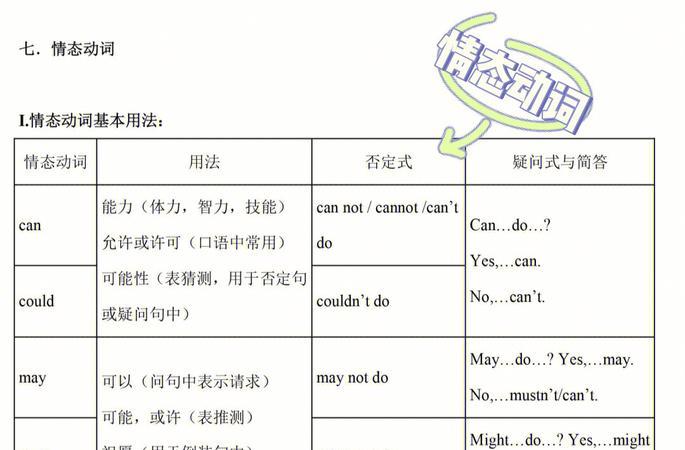英语中的情态动词,包括can, could, may, might, shall, should, will, would, must等,用于表达说话者的态度、意愿或推测。例如,"can"表示能力、许可或可能性,"could"表示过去的能力、许可或可能性,"may"表示许可、可能性或礼貌的请求等。熟练掌握这些动词可以提高英语交流的效果。

-
Can: 表示能力、许可或可能性。例如:I can speak Chinese.(我会说中文。)Can I go to the restroom?(我可以去洗手间吗?)It can be expensive to live in the city.(在城市里生活可能很贵。)
-
Could: 过去式形式表示过去的能力、许可或可能性,也可以表示礼貌的请求或建议。例如:I could swim when I was young.(我小时候会游泳。)Could I borrow your pen, please?(请问我能借用你的笔吗?)You could try the new restaurant.(你可以试试新餐厅。)
-
May: 表示许可、可能性或礼貌的请求。例如:May I leave early today?(我今天可以早退吗?)It may rain tomorrow.(明天可能会下雨。)May I ask a question?(我可以问一个问题吗?)
-
Might: 表示可能性或礼貌的请求。与 may 类似,但语气更委婉。例如:I might go hiking this weekend.(我周末可能会去徒步旅行。)Might I have a glass of water, please?(请问我可以喝一杯水吗?)
-
Shall: 表示将要发生的事情或建议。在美国口语中很少使用,但在英国口语中常用。例如:I shall arrive at the airport at 3 o'clock.(我将在3点到达机场。)Shall we go to the cinema tonight?(今晚我们去看电影吧?)
-
Should: 表示建议、期望或责任。例如:You should study hard for the exam.(你应该好好复习考试。)We should recycle more to protect the environment.(我们应该更多地回收废品来保护环境。)
-
Will: 表示将要发生的事情或意愿。例如:I will meet you at the station tomorrow.(我明天会在车站见你。)I will help you with your homework.(我会帮你做作业。)
-
Would: 过去式形式用于表示过去的意愿或建议,现在式形式用于委婉的请求或表示假设。例如:He would always help his friends.(他总是愿意帮助他的朋友。)Would you mind opening the window?(请问你可以开窗户吗?)If I had more time, I would travel around the world.(如果我有更多时间,我会环游世界。)
-
Must: 表示必须、肯定或推断。例如:I must finish my report before Friday.(我必须在周五之前完成我的报告。)You must be tired after a long day at work.(你一定在工作了一整天后很累了。)He must have missed the train.(他一定错过了火车。)

